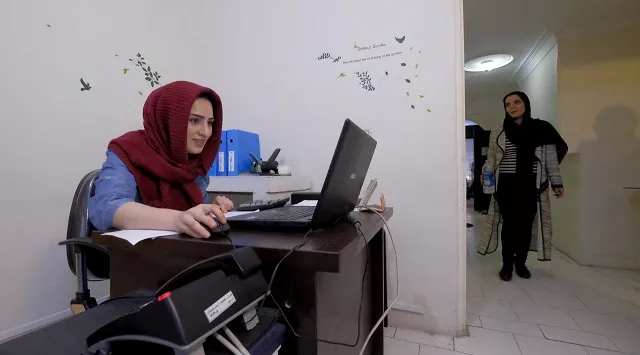Coronavirus work-from-home push means long nights, employee health checks for cloud firms
The intercontinental spread of a novel coronavirus in recent weeks has many businesses rushing to cloud computing
Italian IT shop owner Simone Merlini joined a 2 p.m. call on Wednesday to do something that sounded fairly straightforward: demo three Amazon cloud services to a new client.He ended up finishing at 1 a.m., taking dinner and a beer at his desk, after an unexpected engineering sprint to get 400 of the customer’s employees prepared to work from home for the first time.
“You can imagine my face in the conference call when their ask changed,” he said.
The intercontinental spread of a novel coronavirus in recent weeks has many businesses rushing to cloud computing, particularly work-from-home software. It is spreading thin IT consultancies that install those systems, such as Merlini’s 35-person shop, beSharp near Milan, and is also spawning extraordinary measures at the data centers that make up the “cloud.”
Several data center managers said they are taking their workers’ temperatures to check for fever, limiting visitors and laying in food, water, and other supplies to ensure that operations that have just become even more important to global trade withstand any shocks from the pandemic.
Since it originated in China late last year, the coronavirus that causes the sometimes fatal respiratory illness COVID-19 has killed more than 5,000 people worldwide and been reported in more than 130 countries.
“It’s a complicated and sad time but from a business point of view, it’s quite incredible for us,” Merlini said from home, where he and his wife take turns minding their 2-year-old child in the absence of the regular caretakers who are unreachable.
Twitter tells all staff to work from home due to coronavirus
Most businesses in the world still rely on software and computers that are maintained in physical offices and cannot be easily used in any other way. But as government travel restrictions in Italy, China, the United States and elsewhere make those offices inaccessible, companies must find ways to keep operations humming.
For many, including the multinational company working with Merlini, the solution has been services such as Amazon WorkSpaces that live in server-filled data centers, where businesses can store data and software and stream it online to users anywhere.
Amazon Web Services, the online retailer’s cloud computing unit, said it has received many inquiries in the wake of the coronavirus outbreak but declined to elaborate.
BIG RUSH
Merlini, whose business partners with Amazon, said the cloud giant had sent him five potential customers in recent days. Another five companies reached out directly.
Laptops are not common among Italian businesses, including at the client whose local workforce Merlini helped bring to the cloud in one night, he said. The client immediately ordered Chromebook laptops from Amazon, he said, the first of which arrived on Friday.
Federico Caboni, managing director of BeeToBit, an Amazon partner on Italy’s Sardinia island, said he just helped its capital city of Cagliari set up 250 employees to work from home nearly overnight.
The institution required rigorous security controls to allow staff to use personal devices for work because it handled private-citizen data, Caboni said. The customer had been testing Amazon’s WorkSpaces, he said, otherwise “doing it all last-minute would’ve been a challenge, and quite expensive.”
TalkDesk, which sells software to companies enabling customer service workers to take calls from home, said its coronavirus-inspired offer to new customers of three months’ service for free won over at least one company.
The new financial services customer wants 50 agents working remotely by April in Seattle, where the virus has spread widely, TalkDesk said. It plans to use free trials of TalkDesk’s mobile app for two weeks as it sets up a more robust system for agents in Seattle and up to 450 others elsewhere.
NEW PROTOCOLS
At data centers, doors have been shut to clients, consultants and construction as operators strip to core personnel to avoid the risk of infecting the highly trained workers who tend to the care and feeding of the sophisticated equipment and network connections.
Digital Realty Trust Inc, which operates 210 data centers globally, said it is monitoring temperatures of workers in Singapore and Hong Kong since fever is a known virus symptom. Globally, it required cleaners to use solutions with at least 70% alcohol content on high-touch areas such as door handles and biometric readers every day. Cleaners were trained to wear protective gear and wipe down solutions only after some time, Digital Realty said.
It also has been ensuring that data centers have food, water, fuel and sleeping quarters for staff to shelter in place for up to 72 hours.
VMware, a major vendor of remote working tools, said it divided staff into smaller groups “to cover additional shifts and provide backups” for “uninterrupted physical presence” in data centers.
Coronavirus impacts gaming events, eSports tournaments
Equinix Inc’s 200 data centers now have similar temperature checks and health and travel questionnaires. The company said it would remotely manage any data center with a confirmed case of the virus and that workers from another location would fill in while regular staff is quarantined.
Elizabeth Peichel, a spokeswoman for Critical Environments Group, which maintains power and cooling systems for data centers, said though some clients have put off upgrades amid the visitor restrictions, some systems will inevitably require repairs.
But pandemic-related trade cutbacks have led to shipments taking three times as long, as usual, she said.
In addition, market researcher TrendForce said prices for some server parts are up 5% to 20% because of high demand. It said, for instance, at cloud operator Tencent, “academic and corporate clients are turning to distance education and telework,” increasing its server needs by 20% this year.


COMMENTS
Comments are moderated and generally will be posted if they are on-topic and not abusive.
For more information, please see our Comments FAQ